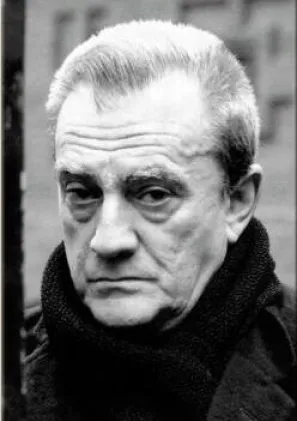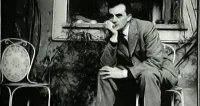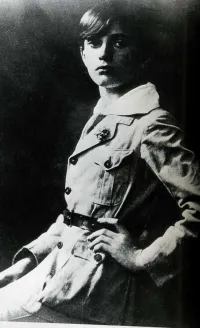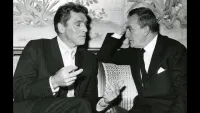Biography
1906 - 1976
"I like melodrama because it is situated just at the meeting point between life and theater."
- Luchino Visconti
Born in Milan to an aristocratic family, Luchino Visconti was raised amidst great art. His film career began in the late 1930s when his friend Coco Chanel suggested to Jean Renoir that he use Visconti as an assistant director. During WWII Visconti, who was a member of the Italian Communist Party, allowed his palazzo to be used as headquarters for the Communist Resistance, which had been mobilized against the German occupation. After a trip to Hollywood, he returned to Italy and directed ‘Obsession’ (1943) – considered the first neorealist film – which he funded through the sale of some of his family’s jewels. Additional early film titles include ‘La terra trema’ (1948), ‘Bellissima’ (1951), ‘Senso’ (1954), ‘Rocco and His Brothers’ (1960) and ‘Boccaccio ’70’ (1962). From 1946 to1960 Visconti also directed many theater productions including works by Tennessee Williams and Jean Cocteau. His passion extended to opera direction, where his impressive career includes a famous revival of ‘La traviata’ starring Maria Callas, who credited Visconti with teaching her how to act. He subsequently had great success with Callas in ‘Anna Bolena.’ Additional Visconti opera productions include ‘Don Carlos,’ ‘Macbeth,’ and ‘Falstaff.’ It was film, however, that Visconti found his true passion. He won the Palm d’Or at the Cannes Film Festival for ‘The Leopard’ (1963), which many consider his masterpiece. In 1969 he received an Academy Award nomination for Best Original Screenplay for ‘The Damned,’ which starred Helmut Berger, his lover since 1964. Their collaboration continued with Visconti’s ‘Ludwig’ (1972) and ‘Conversation Piece’ (1974). Visconti also adapted two literary classics for critically acclaimed film versions of Camus’ ‘The Stranger’ (1967) and Thomas Mann’s ‘Death in Venice’ (1971). Visconti died in Rome of a stroke at the age of 69, shortly after completing his final film ‘The Innocent.’
1906 - 1976
"I like melodrama because it is situated just at the meeting point between life and theater."
- Luchino Visconti
Born in Milan to an aristocratic family, Luchino Visconti was raised amidst great art. His film career began in the late 1930s when his friend Coco Chanel suggested to Jean Renoir that he use Visconti as an assistant director. During WWII Visconti, who was a member of the Italian Communist Party, allowed his palazzo to be used as headquarters for the Communist Resistance, which had been mobilized against the German occupation. After a trip to Hollywood, he returned to Italy and directed ‘Obsession’ (1943) – considered the first neorealist film – which he funded through the sale of some of his family’s jewels. Additional early film titles include ‘La terra trema’ (1948), ‘Bellissima’ (1951), ‘Senso’ (1954), ‘Rocco and His Brothers’ (1960) and ‘Boccaccio ’70’ (1962). From 1946 to1960 Visconti also directed many theater productions including works by Tennessee Williams and Jean Cocteau. His passion extended to opera direction, where his impressive career includes a famous revival of ‘La traviata’ starring Maria Callas, who credited Visconti with teaching her how to act. He subsequently had great success with Callas in ‘Anna Bolena.’ Additional Visconti opera productions include ‘Don Carlos,’ ‘Macbeth,’ and ‘Falstaff.’ It was film, however, that Visconti found his true passion. He won the Palm d’Or at the Cannes Film Festival for ‘The Leopard’ (1963), which many consider his masterpiece. In 1969 he received an Academy Award nomination for Best Original Screenplay for ‘The Damned,’ which starred Helmut Berger, his lover since 1964. Their collaboration continued with Visconti’s ‘Ludwig’ (1972) and ‘Conversation Piece’ (1974). Visconti also adapted two literary classics for critically acclaimed film versions of Camus’ ‘The Stranger’ (1967) and Thomas Mann’s ‘Death in Venice’ (1971). Visconti died in Rome of a stroke at the age of 69, shortly after completing his final film ‘The Innocent.’
Demography
Demography
Gender Male
Sexual Orientation Gay
Gender Identity Cisgender
Ethnicity Caucasian/White
Faith Construct Catholic
Nations Affiliated Italy
Era/Epoch World War II (1939-1945)
Field(s) of Contribution
Film
Theater
Commemorations & Honors
Cannes Film Festival Palme d'Or for The Leopard (1963)
Golden Lion for Vaghe stelle dell'Orsa (1965)
Academy Award Nomination for Best Original Screenplay for The Damned (1969)
Demography
Gender Male
Sexual Orientation Gay
Gender Identity Cisgender
Ethnicity Caucasian/White
Faith Construct Catholic
Nations Affiliated Italy
Era/Epoch World War II (1939-1945)
Field(s) of Contribution
Film
Theater
Commemorations & Honors
Cannes Film Festival Palme d'Or for The Leopard (1963)
Golden Lion for Vaghe stelle dell'Orsa (1965)
Academy Award Nomination for Best Original Screenplay for The Damned (1969)
Resources
Resources
Leprohon, Pierre. The Italian Cinema. Roger Greaves and Oliver Stallybrass, trans. New York: Praeger, 1972.
Nowell-Smith, Geoffrey. Visconti. Garden City, N.Y.: Doubleday, 1968.
Servadio, Gaia. Luchino Visconti: A Biography. New York: F. Watts, 1983.
Stirling, Monica. A Screen of Time: A Study of Luchino Visconti. New York: Harcourt Brace Jovanovich, 1979.
http://www.luchinovisconti.net/visconti_pg/biography.htm
http://www.imdb.com/name/nm0899581/
http://en.wikipedia.org/wiki/Luchino_Visconti
http://gayfortoday.blogspot.com/2007/11/luchino-visconti.html
https://www.bfi.org.uk/news-opinion/news-bfi/features/fast-track-fandom-where-begin-luchino-visconti
Resources
Leprohon, Pierre. The Italian Cinema. Roger Greaves and Oliver Stallybrass, trans. New York: Praeger, 1972.
Nowell-Smith, Geoffrey. Visconti. Garden City, N.Y.: Doubleday, 1968.
Servadio, Gaia. Luchino Visconti: A Biography. New York: F. Watts, 1983.
Stirling, Monica. A Screen of Time: A Study of Luchino Visconti. New York: Harcourt Brace Jovanovich, 1979.
http://www.luchinovisconti.net/visconti_pg/biography.htm
http://www.imdb.com/name/nm0899581/
http://en.wikipedia.org/wiki/Luchino_Visconti
http://gayfortoday.blogspot.com/2007/11/luchino-visconti.html
https://www.bfi.org.uk/news-opinion/news-bfi/features/fast-track-fandom-where-begin-luchino-visconti







